Advertisements
Advertisements
प्रश्न
Look at the words the poet uses to describe what he sees and hears at Innisfree
- Bee-loud glade
- Evenings full of the linnet’s wings
- Lake water lapping with low sounds
What pictures do these words create in your mind?
उत्तर
- These words bring to our minds the image of buzzing bees.
- These words bring up the image of linnets flying across an evening sky.
- These words evoke not only the image but also the soft sound of a lake's water washing the shore.
APPEARS IN
संबंधित प्रश्न
Answer these question in a few words or a couple of sentence.
What do you think a telebook is?
Answer these question in one or two words or in short phrase.
Name five kinds of flutes.
Based on your reading of the story, answer the following question by choosing the correct options.
One could hammer nails into Corporal Turnbull without his noticing it because ____
Read the following extracts from the story, and try to puzzle out the meanings of the encircled words from other words and phrases in the extract. Write the clues in the empty boxes. Then give your own explanation of the encircled word.
When the liner had finally vanished over the horizon, I was absolutely alone in the stormy night sea. First I thought I had to swim one way, then another. It was not even midnight yet, and I had no hope at all of finding my way in this terrible night time ocean. I began to feel afraid. Waves of fear rolled through me, starting from my hands and feet, attacking my heart and then reaching through my neck to my head. Waves broke over me and water went into my snorkel. I realised I would not be able to last even half an hour in such a condition.
I saw individual stars, but I could not distinguish the constellations they belonged to. Then dawn came and put out all my stars and I felt my solitude more keenly. The sky was grey at first, then blue-violet shades appeared. In a few minutes, the colours became brighter, with dark red strips cutting across the sky!
The rising sun came up over the ocean. I was surrounded by large waves. The clouds turned pink and swept across the sky in all directions. It was a windy day.
There was no land visible. I grew alarmed. Had I made a mistake in my calculations? Perhaps the current had carried me a long a way off the course during the night?
An hour passed, perhaps two. "Landlll" I could not deny myself the pleasure of shouting the magic word aloud and of hearing my own voice. Perhaps it was my ghostly island of Siargao? I almost felt I had succeeded - now at least I had hope.
The sun looked out for the last time, as if it was saying goodbye to me, and hid itself away again. In a few minutes the sky was filled with all the colours of a rainbow, the bright shades changing and merging as I watched. At first the clouds became deep red and then their edges turned bright orange. A little while afterwards, the clouds turned lilac and dark violet. Darkness fell swiftly. My second lonely night in the ocean began. The stars came out unnoticed. I changed course and headed for the south west. As it turned out, this was an unforgivable mistake.
Evening was approaching. The ocean around me was full of life; large fish often leapt out of the water and big birds flew right above my head. I could see the island distinctly now. A line of dancing palms stretched the length of its shore. The sides of the mountain were covered in many different shades of green.
An hour passed, perhaps more. It was extraordinarily quiet. Then suddenly to my horror, I discovered my island had noticeably begun to move north and was drifting further and further in that direction right before my eyes. Before I had worked out what was happening and could sharply change my course towards the north, the southern tip of the island had appeared in front of me and, beyond that, open ocean stretched to the very horizon. I was totally at the mercy of the current and realised to my alarm that it was slowly carrying me past the land.
My third night in the ocean crept up unnoticed. This third night in the ocean was very dark, much darker than the two previous ones. I almost decided to die as I had no hope of seeing another dawn. I was suddenly aware of a quiet voice: "Swim to the sound of the breakers."
Indeed, there had been a distant rumbling for some time, although I had paid no attention to it. Now, I started listening and I thought it sounded like the characteristic noise of jet aeroplanes constantly landing and taking off. The voice inside kept insisting that I should swim towards this thunder of waves.
At last I obeyed. Again I heard an approaching rumble. What I suddenly saw at a distance of about 30 or 40 metres has imprinted itself on my memory forever. It was a gigantic wave with steep, very slowly falling crests. Never in my life had I seen such an enormous wave - it even seemed to be touching the sky. It moved very slowly and was fantastically beautiful.
The wave did not break over me as I assumed it would. An irresistible force dragged me up its steep slope right to the very foot of the falling crest. Instinctively I clutched my mask snorkel and managed to take a deep breath. The crest started to break over me and pulled me under it. For a moment, I found myself in the air
under the crest as ifin a cave. Then my body was in a swirling current of water; the inner power of the wave made me recover several times, twisting me in all directions before it subsided.
I realised that I had to try to keep my body on the crest and I quickly took up a horizontal position. This time the wave quickly grabbed me and carried me at great speed for quite a long distance on its crest.
I got up to the surface easily and swam in the direction the waves were heading. "Somewhere there, beyond the reef, there should be a lagoon," I hoped.
Suddenly, I felt something hard under my feet. I could stand up to my chest in water! Around me I could see random currents of water, splashes of foam and phosphorescent spray, all swirling about. Before I fully came to my senses, another large wave approached and carried me some distance further. I was up to my waist in water when a new wave picked me up, taldng me several metres forward. Now the depth of the water was only up to my knees. I had enough time to take a few tentative steps, to catch my breath and look around.
I surfaced at the foot of very tall palm trees. I left a trail of luminous water and my body glittered like some princess's ball-gown. Only now did I feel completely safe. The ocean was behind me ....
(a) I saw individual stars, but I could not distinguish the constellation they belonged to. Then dawn came and put out all my stars.
Therefore, constellation means ................... 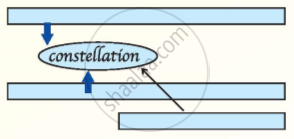
(b) Indeed there had been a distant rumbling for some time, although I had paid no attention to it. Now that I started listening to it I thought it sounded like the characteristic noise of jet airplanes constantly landing and taking off.
Therefore, rumbling means ............
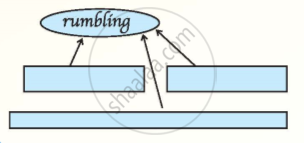
(c) It was a gigantic wave with steep, very slowly falling crests. Never in my life had I seen such an enormous wave. It seemed to be touching the sky.
Therefore, gigantic means ............
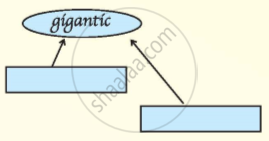
(d) The wave did not break over me as I assumed it would. An irrsistible force dragged me up its steep slope, right to the very foot of the falling crest.
Therefore , irrisistible means.....................

(e) For a moment, I found myself caught in the air under the crest, as if in a cave . Then , my body was in the swirling current of water ; the inner power of the wave made me recover several times , twisting me in all directions before it subsided .
Therefore , swirling means..........
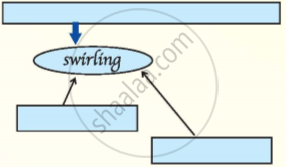
(f) All around me I could see random currents of water splashes of foam and phosphorescent spray of luminous water and my body glittered like some princess's ball gown.
Therefore, phosphorescent means .................
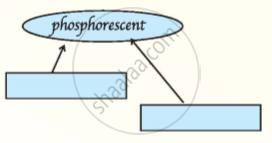
Given below is a map of the area in which Slava Kurilov faced his ordeal. You will also see the major events in the story, in mixed order, each accompanied by a symbol. After you have read 'Ordeal in the Ocean', draw the appropriate symbol against each x mark. (One is already drawn for you.) Draw the symbols or number the symbols, and transfer them to the map.)
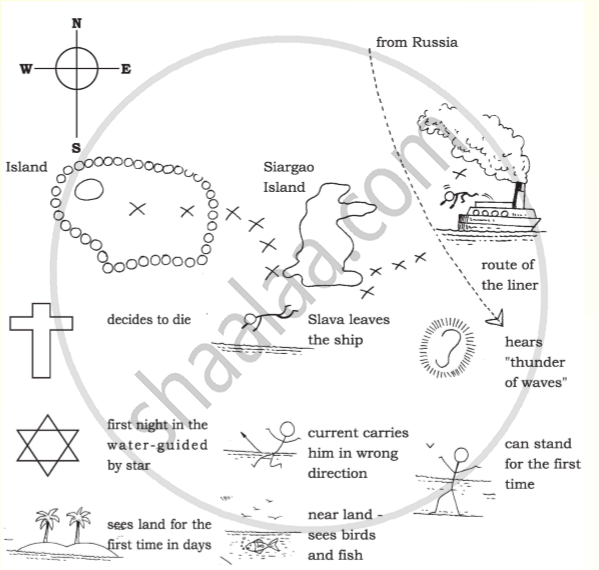
“There were three animals altogether,” he explained. “There were two goats and a cat and then there were four pairs of pigeons.”
“And you had to leave them?” I asked.
“Yes. Because of the artillery. The captain told me to go because of the artillery.” “And you have no family?” I asked, watching the far end of the bridge where a few last carts were hurrying down the slope of the bank.
“No,” he said, “only the animals I stated. The cat, of course, will be all right. A cat can look out for itself, but I cannot think what will become of the others.”
“What politics have you?” I asked.
“I am without politics,” he said. “I am seventy-six years old. I have come twelve kilometers now and I think now I can go no further.”
“This is not a good place to stop,” I said. “If you can make it, there are trucks up the road where it forks for Tortosa.”
“I will wait a while,” he said, “ and then I will go. Where do the trucks go?” “Towards Barcelona,” I told him.
“I know no one in that direction,” he said, “but thank you very much.
Read the extract given below and answer the question that follow.
Where did the narrator want the old man to go?
The boy looked up. He took his hands from his face and looked up at his teacher. The light from Mr. Oliver’s torch fell on the boy’s face, if you could call it a face. He had no eyes, ears, nose or mouth. It was just a round smooth head with a school cap on top of it.
And that’s where the story should end, as indeed it has for several people who have had similar experiences and dropped dead of inexplicable heart attacks. But for Mr. Oliver, it did not end there. The torch fell from his trembling hand. He turned and scrambled down the path, running blindly through the trees and calling for help. He was still running towards the school buildings when he saw a lantern swinging in the middle of the path. Mr. Oliver had never before been so pleased to see the night watchman. He stumbled up to the watchman, gasping for breath and speaking incoherently.
What is it, Sahib? Asked the watchman, has there been an accident? Why are you running?
I saw something, something horrible, a boy weeping in the forest and he had no face.
No face, Sahib?
No eyes, no nose, mouth, nothing.
Do you mean it was like this, Sahib? asked the watchman, and raised the lamp to his own face. The watchman had no eyes, no ears, no features at all, not even an eyebrow. The wind blew the lamp out and Mr. Oliver had his heart attack.
Read the extract given below and answer the question that follow.
What was strange about the watchman? What happened to Mr Oliver when the watchman raised the lantern to show his face?
“You haven’t brought home that sick brat!” Anger and astonishment were in the tones of Mrs. Joe Thompson; her face was in a flame.
“I think women’s hearts are sometimes very hard,” said Joe. Usually Joe Thompson got out of his wife’s way, or kept rigidly silent and non-combative when she fired up on any subject; it was with some surprise, therefore, that she now encountered a firmly-set countenance and a resolute pair of eyes.
“Women’s hearts are not half so hard as men’s!”
Joe saw, by a quick intuition, that his resolute bearing h«d impressed his wife and he answered quickly, and with real indignation, “Be that as it may, every woman at the funeral turned her eyes steadily from the sick child’s face, and when the cart went off with her dead mother, hurried away, and left her alone in that old hut, with the sun not an hour in the sky.”
“Where were John and Kate?” asked Mrs. Thompson.
“Farmer Jones tossed John into his wagon, and drove off. Katie went home with Mrs. Ellis; but nobody wanted the poor sick one. ‘Send her to the poorhouse,’ was the cry.”
“Why didn’t you let her go, then. What did you bring her here for?”
“She can’t walk to the poorhouse,” said Joe; “somebody’s arms must carry her, and mine are strong enough for that task.”
Read the extract given below and answer the question that follow.
Does the attitude of the villagers convey some truth about society at large?
Write ‘True’ or ‘False’ against each of the following statements.
(i) Timothy and Grandfather went to Lucknow in a special compartment.
(ii) The compartment in which Grandfather and Timothy travelled had no other passenger.
(iii) Timothy and Grandfather travelled in a first-class compartment.
(vi) All passengers in the compartment thought that Timothy was a well-fed and civilized tiger.
Who was Gopal? What was the challenge given to him by the king? How he won it?
Give a character sketch of the shepherd. What qualities pleased the king?
Who have tea parties under the shade of the trees?
Why is it a great pleasure to walk through the meadows?
Try to make a kite with your friends. Collect the things required such as colour paper/newspaper, thread, glue, a thin stick that can be bent. After making the kite see if you can fly it.
Multiple Choice Question:
When does the kite look bright?
Multiple Choice Question:
The child wants to make sure whether his teacher also had ________.
Read the following extract from Maya Angelou's poem, 'I Know Why the Caged Bird Sings' and answer the questions that follow:
|
But a caged bird stands on the grave of dreams |
- How does Angelou describe the state of the free bird in the opening lines of the poem? [3]
- Give a brief description of the caged bird's physical and mental condition. [3]
- Explain the phrase, 'grave of dreams' in your own words.
What does the caged bird sing about? [3] - The 'free bird' and the 'caged bird' in the poem represent different groups of people. Name them.
Name any one group of people that you would call 'caged birds' in today's world. [3] - What does the title of the poem, 'I Know Why the Caged Bird Sings', tell us about Maya Angelou's life?
Mention two ways in which the world of the caged bird differs from that of the free bird. [4]
Read the following extract from Jesse Owens's short story, ‘My Greatest Olympic Prize’ and answer the question that follows:
| I wasn't too worried about all this. I'd trained, sweated and disciplined myself for six years with the Games in mind. While I was going over on the boat, all I could think about was taking home one or two of those gold medals. I had my eye especially on the running broad jump. |
- What does Owens mean by 'all this'? What games does he refer to? [3]
- What made Owens confident of winning a gold medal or two? [3]
-
What was the ‘surprise’ that Hitler had kept hidden from the world?
How did Owens feel when he came face to face with the ‘surprise’? [3] - Describe Owens’ performance in the broad jump trials.
What doubts filled his mind at this time? [3] - What makes Luz Long’s behaviour at the ‘Games’ truly remarkable in the context of the times?
Identify a theme that is common to the short story ‘My Greatest Olympic Prize and the poem ‘Nine Gold Medals’. [4]
In the short story, Quality, what causes the death of the younger Gessler brother?
In the poem, John Brown, John Brown drops his medals into his mother's hands because ______.
